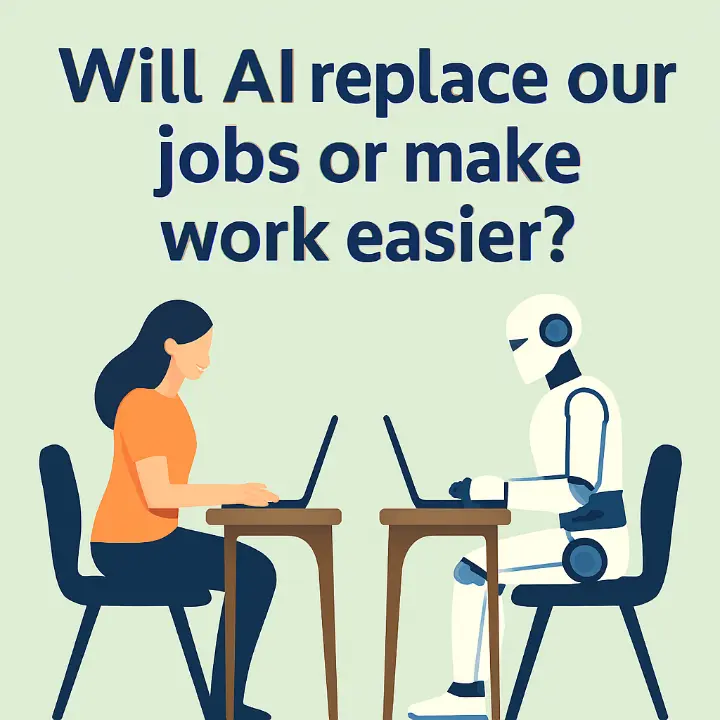In the whirlwind of technological evolution, artificial intelligence (AI) stands as both a beacon of promise and a shadow of disruption. The age-old question echoes louder than ever: Will AI render us obsolete, stripping away livelihoods, or will it be the ultimate sidekick, lightening our workloads and unlocking new potentials? To gauge the pulse of the people, I dove into recent discussions on X (formerly Twitter), where voices from tech enthusiasts, skeptics, and everyday workers collide. The verdict? It's a house divided—equal parts optimism and alarm—but with a recurring theme: adaptation is key.
The Doomsayers: AI as the Job Reaper
A significant chorus warns that AI isn't here to assist; it's here to supplant. One user starkly put it: "AI will now and always lack the capacity to replace all work... but it will make work easier and more efficient." Yet, others paint a bleaker picture. Projections abound: By 2030, AI agents could displace 70% of office tasks, funneling trillions into the global economy while leaving workers in the dust. Echoing this, a post laments how AI targets not just rote labor but decision-making itself, likening it to historical shifts like the loom or assembly line—but with a twist: "Each killed jobs—but multiplied human capability. AI feels different."
In creative fields, the fear intensifies. A designer-turned-AI-user shared how tools like ChatGPT slashed their need for external hires: "I don’t need to hire a designer anymore... AI is the biggest superpower we’ve ever had access to—and if you’re not learning how to use it, chances are, it’ll replace you too." Junior roles are already feeling the squeeze, with one observer noting, "AI is starting to take over junior roles... and this shift could surpass the Industrial Revolution." The net result? A potential "net loss of jobs overall," though not apocalyptic.
The Optimists: AI as the Efficiency Engine
Flip the script, and you'll find cheerleaders who see AI as an amplifier, not a terminator. "AI lowers the barrier to getting started on anything, which means people start doing far more," argues Box CEO Aaron Levie, emphasizing that true excellence still demands human judgment and creativity—AI can't touch that "long tail" just yet. Daily users echo this: "If you're using AI daily... you are at least a couple of years ahead," as it obliterates mundane tasks, potentially slashing back-office headcount by 30%+ while boosting productivity.
Professionals in the trenches agree. A programmer reflects: "AI works better in the hands of a professional... A professional can leverage AI to multiply their capabilities and productivity. I can now work on up to 5 projects in parallel." Even in analysis-heavy roles, AI handles the grunt work, freeing humans for high-value insights. As one post envisions: "With AI's help, one person's work efficiency can be 3-5 times higher." The consensus? New jobs will emerge—think AI oversight departments, much like IT boomed with computers.
The Global Echo: A Bilingual Divide?
Diving deeper into multilingual chatter reveals nuances. English discussions lean toward pragmatic adaptation, with users stressing upskilling. But in Chinese-language threads, the tone skews dystopian: AI as the "next wave crashing the old guard," automating factories from hundreds to mere handfuls of overseers. One user quips, "AI won't shorten work hours for the average person—it'll just pile on more tasks amid fierce competition." Yet, skeptics abound: "AI is unreliable nine times out of ten... It's walked the first step of a long march to replace repetitive work." The fear? Wealth concentration in tech giants, leaving the masses scrambling.
Final Thoughts: Adapt or Perish?
Public opinion isn't a monolith—it's a mosaic of hope and dread. AI will undoubtedly reshape labor, displacing some roles while supercharging others. The winners? Those who wield it as a tool, not a threat. As one futurist warns: "The people who stay are those who know how to use AI in a special way." So, what's your take? Will you code with AI or code against it?
